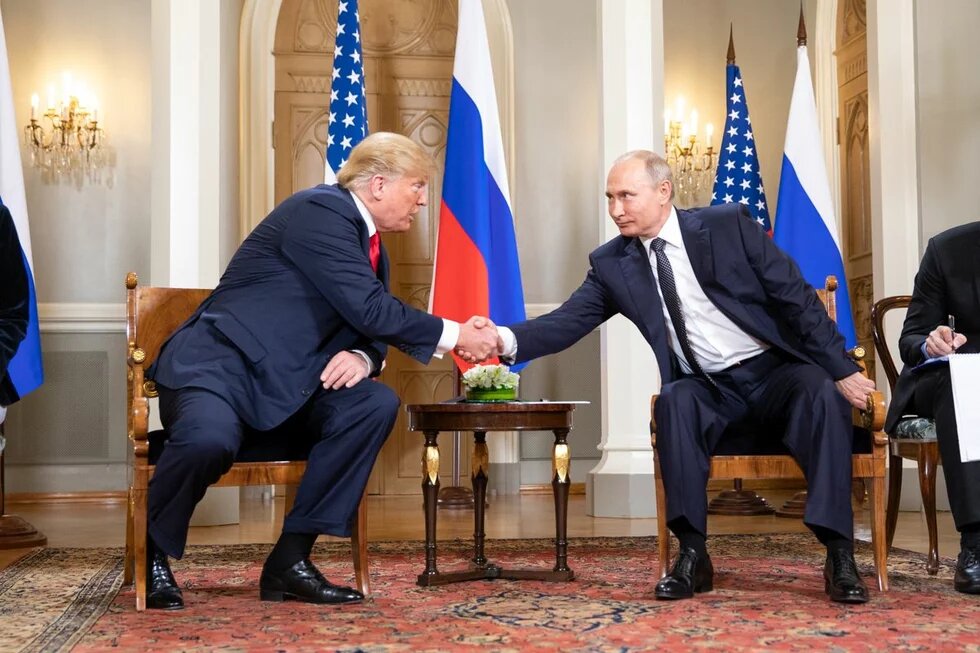Populist authoritarians have recast themselves as champions of peace. Donald Trump, Viktor Orbán, Robert Fico, and others argue that standing up to aggressors only prolongs conflict – they’re wrong.

Donald Trump and the Republican Party have embraced an America First ethos that wraps itself in the language of national renewal. They argue that a warmongering establishment – stretching across both political parties – has dragged the United States into wars of choice, deceived the American people with false promises that globalization would lift all boats, and in doing so left working-class communities behind while footing the bill for costly military adventures abroad.
It was during Trump’s first presidential campaign in 2016 that this frame of thinking became truly ascendant. He harangued his Republican primary opponents, mocking them for supporting the ill-fated invasion of Iraq, and single-handedly refashioned his party’s foreign policy.
Figures like Alice Weidel in Germany, Viktor Orbán in Hungary, and Robert Fico in Slovakia adopted similar narratives, rebranding authoritarian instincts as “peace politics.”
In 2024, Trump ran once more as the self-styled “peace candidate.” He declared, without evidence, that Russia would never have invaded Ukraine under his watch and promised that, if elected, he would end the war in twenty-four hours. The war, of course, has not ended on his timeline. But the rhetoric, and subsequent blaming of Ukraine for a conflict it did not start, again reshaped the Republican Party – and found resonance far beyond American borders. Figures like Alice Weidel in Germany, Viktor Orbán in Hungary, and Robert Fico in Slovakia adopted similar narratives, rebranding authoritarian instincts as “peace politics.”
They suggest that Vladimir Putin is the victim, hounded by a NATO alliance that has encroached on his rightful sphere of influence, and that a response from Russia was inevitable if not justified. By inverting aggressor and victim, these so-called “peacemakers” legitimize conquest and condition citizens to accept domination by the strong over the weak.
The Authoritarian “Peace” Narrative
The authoritarian appropriation of peace follows a simple formula: redefine peace not as the presence of justice but as the absence of resistance to domination. In this telling, the world is best left to “natural” spheres of influence. Great powers accommodate each other’s interests, while smaller states accept subordination. Supporting Ukraine, under this worldview, prolongs a war that could have ended quickly if Kyiv had only surrendered. Resisting Russian aggression, therefore, becomes framed not as defending freedom but as escalating conflict.
Trump exemplifies this inversion. His campaign branded Democrats as “the party of war,” while he cast himself as the candidate of peace. His narrative suggested that Washington’s support for Kyiv – not Moscow’s invasion – was the true driver of conflict. Similar logics animate Orbán’s Hungary, which positions itself as a “pro-peace” voice within the EU by opposing sanctions on Russia and limiting support for Ukraine. Robert Fico, newly empowered in Slovakia, has echoed the same message.
The narrative carries powerful emotional appeal. It promises weary publics an exit ramp from grinding wars. It cloaks authoritarian instincts in the language of compassion, insisting that “real peace” requires ending bloodshed quickly – by conceding to aggressors. Weidel and the AfD are particularly adept at this discourse. They exploit economic precarity and institutional distrust to argue that Germans are being crushed by the weight of a war that is not theirs. Appeals to international solidarity or a community of democracies, they insist, only obscure a harsher reality: Germany cannot afford to stand up to Putin. Beneath the rhetoric lies a deeper ideological affinity: many of these leaders admire Putin’s brand of national conservatism, which they contrast with what they deride as the decadence and weakness of Western liberal democracy. That admiration gives their “peace politics” not just tactical appeal, but also a sense of cultural and moral struggle.
To reclaim peace and security from this appropriation, democrats must both expose the Orwellian inversion at work and articulate a renewed vision of peace rooted in justice, pluralism, and human rights. That task requires reckoning with failures at home and abroad, and building a discourse of peace that resists authoritarian capture.
To reclaim peace and security from this appropriation, democrats must both expose the Orwellian inversion at work and articulate a renewed vision of peace rooted in justice, pluralism, and human rights.
Western Complicity and the Crisis of Credibility
Authoritarians exploit not only public fatigue but also the contradictions of democratic governments. Western failures, especially in the Middle East but also at home, have given populists fertile ground.
President Joe Biden’s blanket support for Israel’s war in Gaza, coupled with his unwillingness to hold Prime Minister Netanyahu’s government accountable for alleged war crimes, has only muddied perceptions globally. Voters across Europe and the United States see an unsettling hypocrisy: how can Washington, Paris, London, and Berlin denounce Russian atrocities in Ukraine while remaining quiet on Gaza? Such double standards erode the moral high ground that democracies need to defend freedom abroad.
Inconsistencies extend beyond Gaza. NATO interventions in Afghanistan and Libya, often justified in the name of human rights, left mixed legacies that authoritarians now exploit. By pointing to Western overreach, populists strengthen their case that liberal powers wage endless war under the banner of peace. Indeed, the evangelizing streak in liberal politics, particularly the liberal internationalism of the post-Cold War period, too often went searching for wars of choice. This is the kernel of truth that helped propel Donald Trump to the White House. He harnessed public cynicism, presenting himself as the only American leader honest enough to admit that endless wars must end.
Yet Trump is no restrainer. From ordering strikes on Iranian nuclear facilities to authorizing a drone attack off the coast of Venezuela, where alleged drug runners were assassinated on a boat that had turned back to port, Trump’s foreign policy record tells a very different story. His vice president, J.D. Vance, carried this logic further still. When accused of supporting a war crime in reference to the Venezuelan drone strike, Vance gleefully fired back on social media with an expletive – remarking, who cares? He later justified the killings by pointing to fentanyl overdoses ravaging American communities.
"This is the highest and best use of our military," he later declared.
The comparison is not subtle. The Trump administration presents itself as defending the American people from real, material harms decimating their communities, while Democrats, in the final stretch of the Biden White House, spent nearly all their political capital on approving another 60 billion US dollar aid package for Ukraine.
Defending Values When It Is Hard
The difficulty, then, lies in defending a values-based approach to the world in the face of both real hypocrisies and material burdens. On one level, the principle is clear: wars of aggression are wrong, even when carried out by great powers. But living by that principle requires sacrifice – standing up to bullies, bearing costs, and resisting the temptation to look away. Ukraine embodies this test: supporting its defense against Russian aggression demands sustained resources and political will, not because it is easy but because it is hard – and because surrender would mean conceding that might makes right.
And once that line blurs, authoritarian leaders can redefine enemies at will – first drug runners, then political dissidents, then ordinary citizens – always in the name of security, never in the service of justice.
Similarly, the rule of law and due process must apply universally, even when they constrain governments or shield those bad actors many would rather see speedily punished. Upholding these values is harder than accepting the easy answers – that strength makes right and that shortcuts to justice will keep the homeland safe. The Venezuelan drone strike shows the danger. Vance readily dismissed concerns about targeted killings, but by abandoning due process protections democracies risk erasing the very line that separates free societies from the criminal organizations and cartels they claim to fight. And once that line blurs, authoritarian leaders can redefine enemies at will – first drug runners, then political dissidents, then ordinary citizens – always in the name of security, never in the service of justice.
A Peace Discourse that Resists Authoritarian Capture
Reclaiming peace and security from authoritarian “peacemakers” require more than exposing distortions; it demands constructing an alternative discourse that resonates with citizens while remaining faithful to democratic values. That discourse must rest on three pillars.
First, peace must be defined as justice, not surrender. Populist leaders present peace as the absence of conflict, even if achieved by capitulation to aggression. Democracies must insist instead that peace endures only when built on sovereignty, dignity, and freedom. Ukraine demonstrates this truth: a forced settlement on Moscow’s terms would not produce peace, but domination.
Second, security must be understood in human terms. Authoritarians frame security as control, as order imposed from above, often by force. A democratic conception recognizes that real security comes from the protection of people: through rule of law, accountable institutions, economic opportunity, and respect for human rights. By connecting international commitments to tangible benefits at home – stronger alliances, safer communities, and fairer economies – leaders can counter the populist claim that supporting democracy abroad means neglecting citizens at home.
Third, consistency matters. Double standards corrode credibility and give authoritarians fertile ground. If Western governments condemn Russia’s aggression while excusing grave abuses in Gaza, they invite the charge of hypocrisy. A democratic peace discourse must apply values evenly, acknowledging failures, correcting course, and making the defense of human rights indivisible.
Building such a discourse is not easy. It requires honesty about past mistakes, courage to bear present costs, and political imagination to show that principles are not abstractions but protections. Yet the alternative is ceding the field to authoritarian and populist leaders who promise quick fixes by turning peace into a euphemism for submission and security into a justification for state repression. Only by reclaiming these terms can democracies offer a better way forward.


